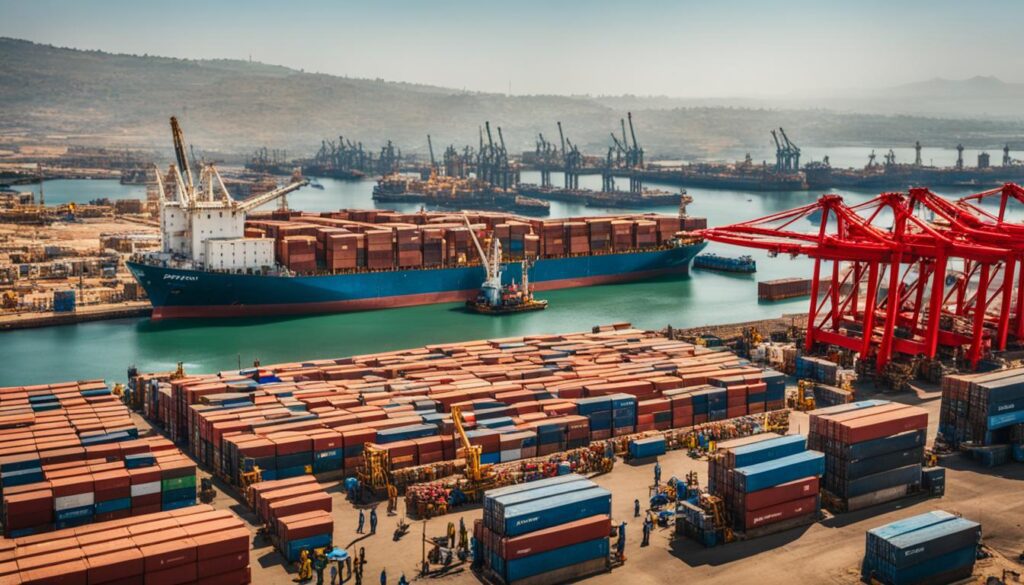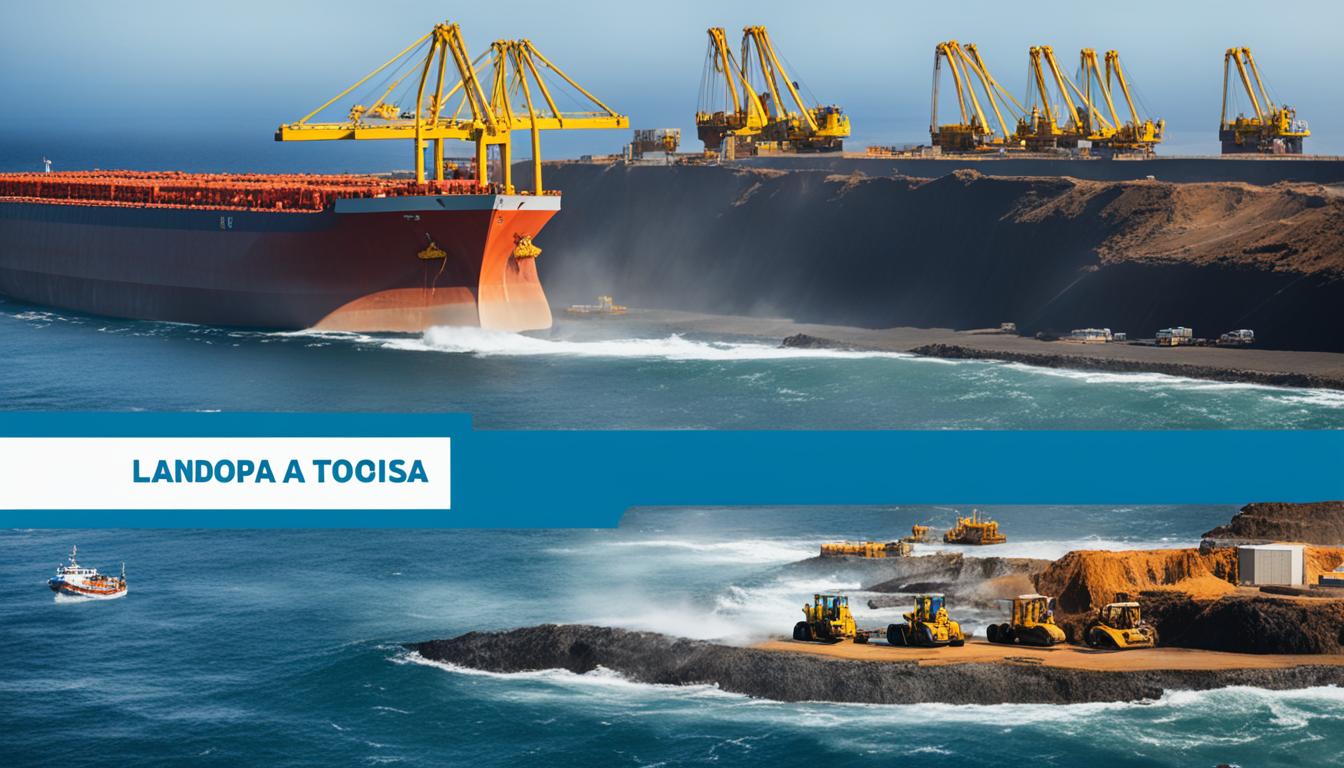Can Ethiopia Get Port?
Did you know that since Eritrea gained independence in 1991, Ethiopia has been landlocked, without direct access to ports? This surprising fact has had a significant impact on Ethiopia’s trade and economic growth. However, Ethiopian Prime Minister Abiy Ahmed is determined to change this by securing port access for Ethiopia, even if it means resorting to force. In this article, we will delve into the challenges faced by Ethiopia in acquiring a port, the importance of port access for its transportation infrastructure and trade expansion, and the potential economic and diplomatic implications of this pursuit.
Key Takeaways:
- Ethiopia has been landlocked since 1991, impacting its trade and economic growth.
- Ethiopian Prime Minister Abiy Ahmed is determined to secure port access, even if it means using force.
- Port access is crucial for Ethiopia’s transportation infrastructure and trade expansion.
- Ethiopia currently heavily relies on the Red Sea port of Djibouti, which imposes high fees.
- Acquiring direct port access can potentially lower trade costs and stimulate economic growth for Ethiopia.
The Importance of Port Access for Ethiopia
Port access plays a vital role in Ethiopia’s transportation infrastructure, trade expansion, and overall economic growth.
Currently, Ethiopia heavily relies on the Red Sea port of Djibouti for its import and export activities. However, the high port fees imposed by Djibouti create a significant financial burden on Ethiopia, hindering its economic development and growth.
By acquiring direct access to a port, Ethiopia can reduce its dependency on Djibouti and diversify its trade routes. This would enable Ethiopia to potentially lower trade costs, stimulate economic growth, and enhance its trade relations with other countries.
Direct access to a port would improve Ethiopia’s transportation infrastructure by providing a more convenient and efficient route for importing and exporting goods. It would also reduce the reliance on land transportation, which is often more expensive and time-consuming.
Furthermore, expanded port access would open up new trade opportunities for Ethiopia, allowing for increased commerce and the potential for strategic partnerships with other nations. This would contribute to the country’s economic growth and promote job creation and prosperity.
“Acquiring direct port access is a crucial step for Ethiopia’s economic development, as it would alleviate the financial burden caused by high port fees and provide new avenues for trade expansion and growth.”
The Impact on Ethiopia’s Trade Expansion
Direct port access would enable Ethiopia to diversify its trade routes and expand its export markets. Currently, the reliance on a single port limits Ethiopia’s ability to explore new trade opportunities.
With access to multiple ports, Ethiopia can establish trade links with different regions, diversify its export portfolio, and tap into emerging markets. This would enhance the country’s competitiveness in the global market and provide a solid foundation for sustained economic growth.
Enhancing Economic Growth Through Port Access
The acquisition of direct port access would significantly contribute to Ethiopia’s economic growth. By reducing trade costs and streamlining transportation routes, Ethiopia can attract more foreign investments and boost its export potential.
A robust transportation infrastructure and expanded trade networks would attract multinational companies looking to establish manufacturing and distribution hubs in Ethiopia. This, in turn, would create job opportunities and improve the standard of living for the Ethiopian population.
The Benefits of Trade Diversification
Diversifying trade routes and gaining direct access to a port would reduce Ethiopia’s vulnerability to geopolitical disruptions and fluctuations in global trade patterns.
Currently, Ethiopia’s heavy reliance on a single port leaves it exposed to potential disruptions, such as political tensions or conflicts in the region. By diversifying its trade routes and securing additional port access, Ethiopia can mitigate these risks and ensure the uninterrupted flow of goods and commodities.
Challenges and Alternatives for Port Access
Despite the desire for port access, Ethiopia faces several challenges in acquiring a port. The neighboring country of Eritrea currently controls the Assab port, which used to serve Ethiopia’s trade needs. However, Eritrea has shown reluctance to engage in discussions regarding port access with Ethiopia.
As a result, Ethiopia has explored alternative options, including discussions with Kenya’s Lamu port and considering port diversification in Somalia and Sudan. These efforts aim to find viable alternatives to reduce dependence on a single port and expand Ethiopia’s trade options.
Port diversification within the East African region can offer multiple benefits for Ethiopia. It allows for more flexibility in trade routes and reduces the risk associated with relying solely on one port. By accessing various ports, Ethiopia can improve its logistical efficiency and potentially access new markets and trading partners.
**”Port diversification within the region can offer multiple benefits for Ethiopia, allowing for more flexibility in trade routes and reducing dependence on a single port.”**
In addition, engaging in discussions with neighboring countries such as Kenya, Somalia, and Sudan not only opens up the possibility of port access but also promotes regional cooperation and strengthens diplomatic ties. These efforts signal Ethiopia’s commitment to finding peaceful solutions and fostering economic collaboration within the East African region.
By exploring alternative options and diversifying its port access, Ethiopia demonstrates resilience and adaptability in overcoming the challenges presented by its landlocked status.
Comparative Overview of East African Ports
The following table compares key features of East African ports that are potential alternatives for Ethiopia’s port access:
| Port | Country | Advantages | Disadvantages |
|---|---|---|---|
| Mombasa | Kenya | Established infrastructure, proximity to Ethiopia | High congestion, potential political instability |
| Lamu | Kenya | Strategic location, planned port expansion | Ongoing development, limited current capacity |
| Berbera | Somalia | Potential for expansion, access to Red Sea | Security concerns, political instability |
| Port Sudan | Sudan | Existing infrastructure, proximity to Ethiopia | Transportation challenges, potential political instability |
The table emphasizes the diverse options available to Ethiopia for port access and highlights the advantages and disadvantages associated with each port. It enables a comprehensive comparison and facilitates informed decision-making regarding the most suitable alternatives for Ethiopia’s port diversification strategy.
Ethiopia’s Assertive Tone and Maritime Strategy
Ethiopian Prime Minister Abiy Ahmed has adopted an assertive tone when discussing port access, emphasizing Ethiopia’s growing population and the need for increased trade opportunities. He has referenced historical ties and maps to assert Ethiopia’s territorial claims to Red Sea ports in Eritrean territory. This rhetoric aligns with Ethiopia’s broader maritime strategy, which aims to secure access to important shipping routes, such as the Red Sea and the Bab el-Mandeb strait. By gaining control over these strategic waterways, Ethiopia can enhance its regional and global trade connectivity.
Economic Impact and Sanctions Concerns

The economic impact of port access for Ethiopia is significant. The country’s continued reliance on the Red Sea port of Djibouti, with high port fees and limited access, has hindered Ethiopia’s economic growth and development. In addition, Ethiopia is currently facing the challenges of post-war reconstruction and recovery, following the conflict in the Tigray region.
Acquiring direct access to a port could greatly benefit Ethiopia’s reconstruction efforts and attract international investments. It would provide a means to efficiently transport goods, facilitate trade, and stimulate economic growth. However, caution must be exercised to avoid jeopardizing Ethiopia’s ongoing negotiations with the International Monetary Fund (IMF) for loans to support its post-war reconstruction.
Any forceful approach in securing port access could result in economic sanctions imposed by the international community. To ensure continued access to international loans and financial support, Ethiopia must prioritize diplomatic negotiations and peaceful solutions that do not disrupt its bilateral and multilateral relations.
The image above highlights the importance of economic growth for Ethiopia’s post-war reconstruction and development.
Ethical and Political Implications
The quest for port access raises ethical and political implications. Ethiopia’s territorial claims to Red Sea ports in Eritrean territory may create tensions and conflicts with neighboring countries. It also involves complex historical disputes and nationalistic sentiments. Ethiopia’s pursuit of port access can impact its relationships with neighboring countries and regional stability. To avoid potential conflict and maintain diplomatic relations, Ethiopia needs to navigate these issues sensitively and engage in peaceful diplomatic negotiations.
Historical Disputes and Territorial Claims
Ethiopia’s territorial claims to Red Sea ports in Eritrean territory are rooted in historical disputes over borders and ownership. These claims have long been a source of tension and conflict between the two countries. The issue of port access is intertwined with Ethiopia’s nationalistic sentiments and aspirations for economic growth and development. However, pursuing these claims without considering the interests and concerns of neighboring countries can lead to further instability in the region.
“Ethiopia’s pursuit of port access should be approached with caution and respect for the sovereignty and territorial integrity of neighboring countries.”
Regional Stability and Diplomatic Relations
The pursuit of port access by Ethiopia can have significant implications for regional stability and diplomatic relations. Ethiopia shares borders with several countries, and any disputes over port access can strain these relationships. It is crucial for Ethiopia to navigate these challenges sensitively and engage in peaceful diplomatic negotiations to avoid potential conflicts. Respecting the sovereignty and territorial integrity of neighboring countries is essential for maintaining regional stability and fostering positive diplomatic relations.
| Ethical Implications | Political Implications |
|---|---|
| Ethiopia’s territorial claims may be seen as a violation of international law and norms. | Port access disputes could lead to political tensions and conflicts among neighboring countries. |
| Unilateral actions by Ethiopia can result in strained diplomatic relations. | Ethiopia’s pursuit of port access may impact its standing in the international community. |
| Ethiopia’s approach to port access can affect its reputation as a responsible regional player. | Political stability in the region can be jeopardized by disputes over port access. |
In order to address these ethical and political implications, Ethiopia should prioritize peaceful diplomatic negotiations, engage in constructive dialogue, and consider the concerns and interests of all parties involved. By approaching the issue with sensitivity and respect, Ethiopia can work towards a mutually beneficial solution that promotes regional stability and fosters positive diplomatic relations.
Domestic Considerations and Popular Support

The pursuit of port access in Ethiopia is not just driven by economic and strategic considerations; it also carries significant domestic implications. Nationalist sentiment, which has long played a substantial role in Ethiopian politics, particularly regarding access to the Red Sea, comes into play. As the Ethiopian government strives to secure port access, it must navigate the delicate balance of maintaining support from nationalist factions while addressing the broader needs of the country.
The prime minister’s rhetoric on port access potentially serves the dual purpose of rallying domestic support and consolidating political strength. By emphasizing the importance of securing direct access to a port, the government is tapping into the nationalist sentiment that resonates with many Ethiopians.
“We must regain control over our own destiny, secure our rightful place in the global trade network, and ensure the prosperity of our nation. Access to a port is not just an economic necessity; it is a matter of national pride and sovereignty.”
In the pursuit of port access, the government must address the concerns and expectations of nationalist factions. This involves striking a delicate balance between promoting their interests and ensuring that the broader needs of the country are met. The government’s ability to effectively manage internal dynamics and garner popular support will significantly influence the path forward in securing port access for Ethiopia.
Diplomatic Options and Regional Cooperation
As Ethiopia strives to gain port access, pursuing diplomatic options and fostering regional cooperation becomes paramount. We recognize the importance of engaging in diplomatic negotiations with neighboring countries to explore peaceful solutions and find common ground in resolving the port access issue. This endeavor requires addressing the concerns and interests of all parties involved, including Eritrea, Djibouti, Somalia, and Sudan.
One effective approach is leveraging existing regional frameworks such as the East African Community and the African Union. These organizations provide platforms for dialogue and collaboration, facilitating constructive conversations that can pave the way for a mutually beneficial resolution. By fostering regional cooperation, we can create a conducive environment that supports sustainable trade and economic growth in Ethiopia and the wider East African region.
We believe that through genuine and transparent negotiations, we can overcome obstacles and achieve a harmonious coexistence that serves the interests of all nations involved. Emphasizing peaceful resolutions and regional cooperation will pave the way for a prosperous future, enhancing stability and fostering positive relationships that extend beyond port access.
“The cooperation and dialogue among East African nations are essential for navigating the complexities of port access. By working together, we can find mutually acceptable solutions and build long-lasting partnerships that drive economic growth and regional development.” – Ethiopian Prime Minister Abiy Ahmed
Potential Consequences of Military Action

In considering the idea of military intervention to secure port access, Ethiopia must carefully weigh the potential risks and consequences that may arise. Any forceful approach towards obtaining port access could have serious ramifications, including regional conflicts, economic sanctions, and international condemnation. Military action may escalate tensions and exacerbate existing conflicts, such as the ongoing war in the Tigray region, hindering Ethiopia’s ability to successfully achieve its goals.
The international community generally opposes military intervention in such situations, emphasizing the importance of peaceful negotiations and diplomatic solutions. Ethiopia would face significant challenges in justifying and sustaining military action, as it would need to navigate through complex political dynamics and international legal frameworks. The potential backlash from the international community could have a detrimental impact on Ethiopia’s international relations and economic stability.
To avoid the potential negative consequences of military intervention, it is essential for Ethiopia to explore alternative approaches that prioritize peaceful negotiations and regional cooperation. By engaging in diplomatic discussions and utilizing international mediation services, Ethiopia can foster an environment conducive to open dialogue and constructive resolutions to the port access issue.
It is vital for Ethiopia to consider the long-term implications of any military action and carefully assess the potential risks and rewards before proceeding. The pursuit of port access should align with Ethiopia’s broader goals of regional stability, economic growth, and peaceful coexistence with neighboring countries.
| Consequences of Military Action | Potential Risks |
|---|---|
| Regional conflicts | Economic sanctions |
| International condemnation | Escalation of existing conflicts |
| Damage to international relations | Challenges in justifying military intervention |
The Role of International Organizations and Mediation
When it comes to the complex negotiations for port access in Ethiopia, international organizations have a vital role to play in facilitating a peaceful resolution. The United Nations and the African Union, for instance, have the expertise and diplomatic influence needed to mediate discussions between Ethiopia and neighboring countries.
Given the potential regional implications and the complexities involved in the port access issue, impartial mediation becomes crucial. The involvement of international organizations can help create a conducive environment for constructive dialogue, bringing all parties to the table and promoting a fair and mutually acceptable solution.
Engaging with international organizations ensures that the negotiations adhere to international norms and principles, promoting a peaceful resolution to the port access issue. By leveraging their experience and neutrality, these organizations can guide the conversation towards a sustainable and mutually beneficial outcome for all stakeholders involved.
By seeking the assistance of international organizations, Ethiopia can demonstrate its commitment to a peaceful and diplomatic approach. This collaborative effort not only strengthens the credibility of the negotiations but also fosters trust and rapport between Ethiopia and its neighboring countries.
International mediation offers a platform for open and transparent discussions, where concerns, interests, and potential compromises can be addressed in a neutral and unbiased setting. This approach minimizes the risk of misunderstandings and miscommunications that may arise in bilateral negotiations.
The involvement of international organizations also enables broader participation and ensures that the voices of all relevant stakeholders are heard. It serves as a mechanism to safeguard the interests of Ethiopia, its neighbors, and the wider international community.
In conclusion, international organizations and mediation play a pivotal role in facilitating successful negotiations for port access in Ethiopia. By leveraging their expertise, neutrality, and diplomatic influence, these organizations can help create a peaceful and sustainable solution to this complex issue, ensuring mutual benefits for all parties involved.
Conclusion
Ethiopia’s pursuit of port access is driven by a combination of economic, strategic, and nationalistic motives. The importance of direct access to a port for Ethiopia’s transportation infrastructure and trade expansion cannot be overstated. However, it is crucial for Ethiopia to approach this issue through peaceful diplomatic negotiations and regional cooperation to avoid severe consequences that could hinder its economic recovery and international relations.
Establishing a dialogue with neighboring countries, seeking mediation from international organizations, and exploring viable alternative options are the key steps that Ethiopia should take to achieve its port access goals. By engaging in constructive discussions, Ethiopia can promote a conducive environment for finding mutually acceptable solutions and ensuring sustainable trade and economic growth.
Any forceful or unilateral action to secure port access could lead to regional conflicts, economic sanctions, and international condemnation. Therefore, it is imperative for Ethiopia to navigate this issue sensitively and consider the broader implications it may have on its relationships with neighboring countries and regional stability.






